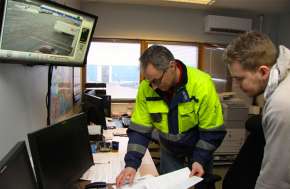The seasons affect tyre warehouses

The Port of Turku is a familiar place of work for Jukka Ylikännö since the time when he was studying in the commercial institute. As a supervisor at DB Schenker’s warehouse he ensures that everything runs smoothly. Tyre warehouses are under control and the customers get the products they need as agreed.
In the Pansio Harbour, a truckload of car tyres has arrived at the tyre warehouse of DB Schenker’s customer in Turku. Warehouse Supervisor Jukka Ylikännö ensures that everything is right: the cargo is what it’s supposed to be, and the number of products matches the order. After unloading and reception of goods he signs the papers and the driver moves on.
“There are thousands of square metres of indoor storage space, part of it in the Pansio Harbour, some in the Late area”, he says about the warehouse volume and his place of work.
The work is characterised by seasons. While there’s still snow on the ground in late winter, you can tell for sure that the summer is coming. The warehouses are filled with summer tyres and gardening machines. Mr Ylikännö shows a warehouse with long lines of ride-on lawnmowers waiting for the summer.
In the warehouse Mr Ylikännö greets familiar inspectors of the Finnish Food Safety Authority Evira who are taking samples from the transport frames of timber. We don’t want new wood-destroying pests to come to Finland with imported products.
“Winter tyres will begin to arrive at the turn of June and July.”
Products supplied to customers as per need
Mr Ylikännö’s job is to take care of the importer’s warehouse and its logistics. The products are shipped from the factories to a warehouse in the Port of Turku. As the storage takes place in the port, the customer’s own shops in different parts of Finland can keep their stocks at a minimum. Products are only ordered as per need. Mr Ylikännö is responsible for arranging the loading and transport of the ordered products as flexibly as possible.
Everyone does their share, and as the supervisor he sees to it that the pieces fall in place.
“I do the office work myself, agree on unloading times and arrange the collection of products.”
Language skills and gestures are needed
English and Swedish skills are needed in the job. Not many words were exchanged with the driver who just left, though. Some of the drivers use just gestures and a few words of English.
“Shipments come from Central and Southern Europe.”
The phone rings and Mr Ylikännö agrees on some changes: one driver has reached the destination ahead of schedule. The agreed unloading time is set for the following day, but luckily the timetables can be adjusted. The driver can unload the cargo and move on.
Mr Ylikännö has been working in the tyre warehouse for the past three years. The Port is a familiar ground for him, though. Already while studying in the commercial institute he worked in the Port on evenings and at weekends. Forwarding companies have merged over the years – in theory his employer has remained the same.
“I like my job. There’s a lot of variation. It’s busier now than before, as is probably the case everywhere.”
Mr Ylikännö appreciates the fact that the employer is a big firm and that the work has been steady. He keeps his energy levels high by playing ice hockey and football 3–4 times a week.
Published in Port of Turku’s customer magazine Aboard 1/2017, which you can find in our material bank.
